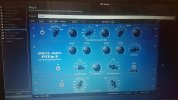I tend to do the opposite of loudness compensation. If I'm listening at low volume it's because I want it to sound quiet, either just because I feel like it, or because I don't want to disturb/wake others. So for quiet listening I use an eq profile with -6dB low shelf at 100Hz.
Then when I want to crank the volume way up, it's because I want to feel it in my chest. But with the regular room curve, the highs get a bit oppressive before it starts to sound really powerful. So I use a profile that gives <40Hz a couple extra dB, and a -3dB high shelf at 1kHz.
Just wanted to throw a different perspective into this, as it's a case where my actual preference is opposite what the science indicates my preference "should" be.
Then when I want to crank the volume way up, it's because I want to feel it in my chest. But with the regular room curve, the highs get a bit oppressive before it starts to sound really powerful. So I use a profile that gives <40Hz a couple extra dB, and a -3dB high shelf at 1kHz.
Just wanted to throw a different perspective into this, as it's a case where my actual preference is opposite what the science indicates my preference "should" be.


